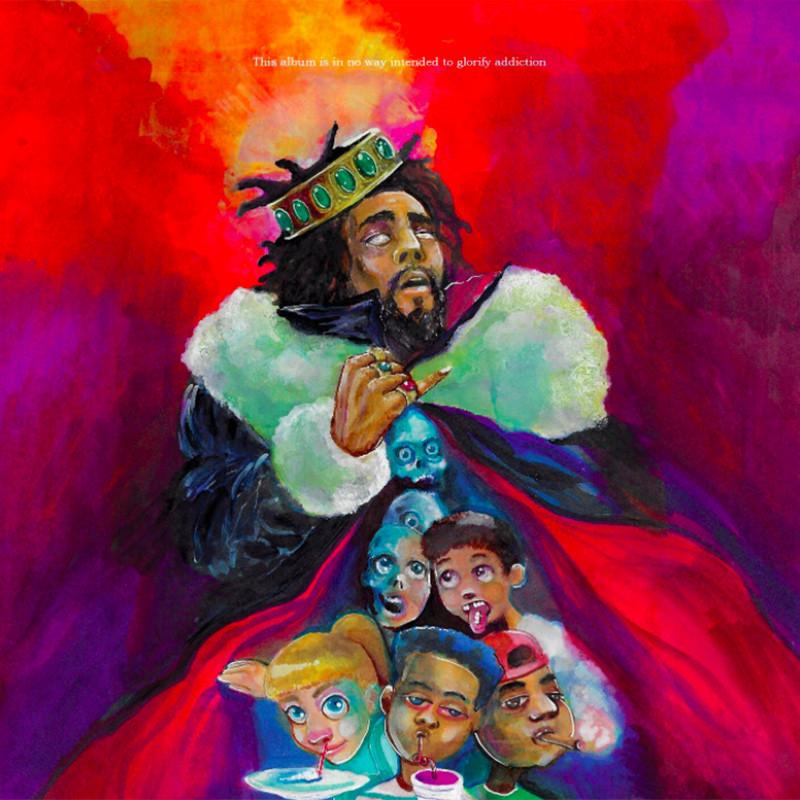Jermaine Lamarr Cole, widely known as “ J.Cole,” has returned with his fifth studio album “KOD,” released on Friday. Following “4 Your Eyez Only,” the emotional, 43-minute long rollercoaster serves as a dedication to his slain friend, while criticising hip-hop’s excessive drug culture. Cole’s bringing new excitement back into hip-hop with his perpetual lyricism that has his name immortalized.
Cole’s built a reputation for staying under the radar, and he has remained quiet with his social media accounts. Surprising fans, he came to Twitter on Wednesday to announce “KOD” and its artwork. The album cover spoke a million words about what was to come with the project, as an image of the artwork sparked controversy because of the portrayal of children participating in the use of drugs. In recent times, hip-hop has been known for glorifying drugs and violence. Maybe “KOD” is Cole’s response to what is happening with hip-hop and its influence on younger generations.
The coincidence between the release date and culture behind it didn’t go unnoticed. On 4/20, a day dedicated to cannabis, the use of the plant on the cover continues the speculation on the meaning of the work’s acronym. “Kids on Drugs,” “King OverDosed,” and “Kill Our Demons” have all been detailed by Cole in videos teased on Twitter.
Cole has been an icon when it comes to introductions. “Intro” holds the underlying message is that everyone has pain and the way we cope with this pain must be ”chosen wisely.” Cole says this phrase is said repeatedly whilst the song fades out, placing importance to the listener about the decisions we make in life. It’s arguable that the intro and tagline on the cover, “This album is in no way intended to glorify addiction,” go hand in hand.
Cole has a different purpose with this album as he showcases his abilities to transcend any current trend of sound happening in hip-hop. Hip-hop has changed immensely in the past years. A faster-paced beat from the roots of South Atlanta, Georgia called “trap” music has inspired the current sound of hip-hop. Cole takes this current trend of beats and adds his clarity and lyricism to it, which combines to create a timeless album that is representative of the current state of hip-hop today.
Songs including “KOD,” “ATM,” “Motiv8” and “1985” are some of the tracks that Cole uses to infuse his lyricism with the South Atlanta trap-inspired beats. The song “ATM” puts the thought of money in perspective, “can’t take it when you die but you can’t live without it,” Cole says
“KOD” slows down with “Kevin’s Heart,” a track with a nostalgic, retro-sounding beat that you’d think was coming from an old video game system. The effortless flow with the beat and melody comes to create a song that anyone can slow down and vibe to.
In “Friends,” Cole features an artist named kiLL Edward. Actually a pitched-down recording of Cole, the song pairs rudimentary beat flow and intricate wordplay to highlight addiction and the excuses made to cope with issues that people have in life. This song gives realization about issues communities have with addiction and how drug use is a vice for children to escape. Cole highlights this in the song with the lyric “them kids is grown and they blowing trees and poppin’ pills dues to the chronic anxiety.”
The project closes with “1985,” and some may say this song is a direct shot to the current wave of hip-hop artist we are seeing. Instead of disrespecting these artists, Cole come in from another direction, giving guidance rather than dissing his peers in the hip-hop game. Cole talks about how he used to relate to the new wave of artists and how he’s adapted to become immortalized in hip-hop.
Cole’s “KOD” does not fail to disappoint, and keeps exceeding expectations. Cole’s ability to combine his wordflow and clarity with the different types of beats is refreshing to hear. Maybe this is what hip-hop has been missing; someone to check the current state of hip-hop and show the new wave of hip-hop artist how to achieve longevity in the game.
Cole’s message throughout “KOD” is easy to digest, highlighting the issues of drug use and addiction. The current state of hip-hop and its glorification of drug culture has to change, and Cole has made immense efforts to address the issue.



































